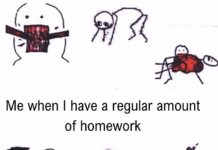As a college student, you already know how much GPAs matter.
Your grade point average determines whether or not you keep your scholarships. It affects your admission into grad school. It could be the tie-breaker when you’re competing for a job. Your parents probably care about it, too, especially if they’re writing big tuition checks.
But grades are also important because they are supposed to reflect what you know and can do.
While everyone wants good grades, it’s often a bad sign when everyone gets them. If that’s happening, the bar for “excellence” is too low. It means some people are getting high grades for doing less, cheapening the value of an A. Moreover, this may leave some students more confident about their knowledge and skills than they should be.
A new report, Easy A’s and What’s Behind Them, by the National Council on Teacher Quality (NCTQ) looks at more than 500 colleges (including Slippery Rock University of Pennsylvania) and finds that, on average, about 30 percent of all students at these schools graduate with grade-based honors. Think about your classes. Are almost a third of the students sitting next to you hitting it out of the park on all their exams and in most of their classes?
Especially troubling for NCTQ, a research organization that advocates for improving the instruction of K-12 students by improving the preparation of their teachers, is that Easy A’s also found that 44 percent of teacher candidates graduate with honors. That means that students getting ready to teach are nearly 50 percent more likely than all their campus peers to earn a high GPA.
Slippery Rock University of Pennsylvania is among the schools that perform worse than average, awarding especially high grades to teacher candidates. Its honors rate for teacher prep candidates was 62.81 percent, while the overall rate for all programs across campus was 36.96 percent. This number puts Slippery Rock University of Pennsylvania in a group of 95 institutions – out of 509 – where the differential between teacher-prep students graduating with honors and all students with honors is a stunning 25 percentage points or more.
The disturbingly large differential raises these questions, “Why are future teachers earning much higher grades than everyone else? Are education majors that much smarter? Is the program too generous in its grading policies? Are the expectations for students too low?”
NCTQ believes that part of the explanation lies in the type of assignments students are given. When you dig into syllabi, education majors often are given what we termed “criterion-deficient” assignments – meaning they are overly broad or subjective. These assignments are often an inadequate gauge of whether students have mastered specific content and skills. Disturbingly, teacher prep programs at the universities we reviewed assign more than twice as much criterion-deficient coursework as other academic programs.
Predictably, criterion-deficient assignments correlate with higher grades – not just in teacher-prep courses, but in other majors as well. This outcome just makes sense: If your grade depends simply on completing an assignment or on your opinion, more people are going to do well.
Relying too heavily on these assignments in any program can cheat students out of knowledge they need to master. Teacher preparation shares much with training for engineers, nurses, or doctors: teacher candidates must learn and master the skills and knowledge they’ll need in the classroom – if not, they are left ill-prepared for the relentlessly tough work that awaits them and risk doing great harm.
The result for teacher candidates and their future students can be devastating.
College can’t teach you everything you’ll need to know to be successful in your field. There’s no substitute for experience, and smart professionals learn on the job every day. But teaching isn’t for the unprepared or underprepared. The profession is too demanding, and children deserve teachers who can be effective from their first day in the classroom.
Regardless of the program you’re in, make sure you’re taking classes where professors have clear indicators of the content you’ll learn and whether you’ve learned it. If they’re not giving substantive feedback, ask for thoughtful critiques that compare your work to a high standard.
In the end, the benefits of an easy A are temporary: when virtually everyone has stellar grades, undeserved high grades won’t help you get a job, and they definitely won’t help you keep it.
Kate Walsh
Washington, DC
Ms. Walsh is the president of the National Council on Teacher Quality





